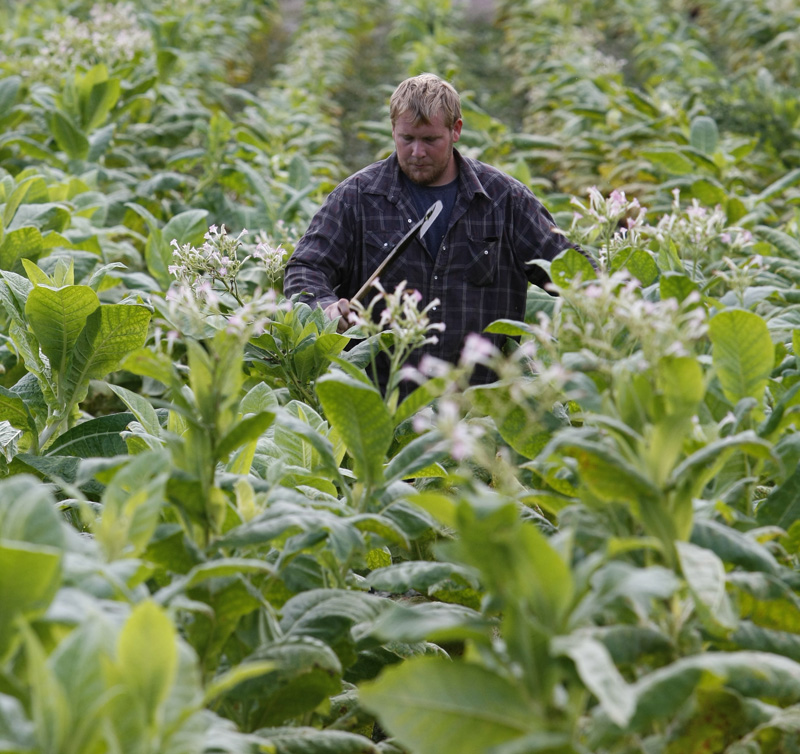RICHMOND, Va. — Some researchers say an age-old cash crop long the focus of public health debate could be used to help solve the nation’s energy crisis, by genetically modifying the tobacco leaf for use as a biofuel.
The golden leaf is the latest in a series of possible biofuels like switchgrass and algae that are being floated as Congress and President Barack Obama stress the importance of securing alternative energy sources.
Scientists believe using tobacco would be beneficial because it would not affect a major U.S. food source, unlike other biofuels made from corn, soybeans and other crops.
But there’s no worry here about second-hand smoke for commuters stuck in traffic: the tobacco wouldn’t be burned to power vehicles, merely used to extract its oils and sugars.
Tobacco is an attractive “energy plant” because it can generate a large amount of oil and sugar more efficiently than other crops, said Vyacheslav Andrianov, a researcher at the Biotechnology Foundation Laboratories at Thomas Jefferson University in Philadelphia.
Andrianov recently co-wrote a paper on how researchers have found a way to genetically engineer tobacco to boost the oil in the plant’s leaves. Researchers found that modifying the plant produced as much as 20 times more oil, according to the report published online in December and featured in a special biofuels edition of the Plant Biotechnology Journal.
“Certainly tobacco could work; any plant is a potential source of biofuel,” said Matt Hartwig, a spokesman for the Renewable Fuels Association. “I know tobacco farms have been hit hard in recent years and this may be an opportunity for some of those tobacco farmers.”
Commercial use for tobacco as a biofuel may be more than five years away, but tobacco farmers look forward to the possibilities, said Andrianov, an assistant professor of cancer biology at the university’s Jefferson Medical College.
“There are other crops that can be used and the idea of tobacco is that it’s not a food crop,” Andrianov said. “I got a lot of response from farmers that would like to grow tobacco in fields that are not being used right now.”
According to the Food and Agriculture Organization of the United Nations, tobacco production has dropped about 1.5 percent worldwide over the past 10 years. Production has decreased by nearly 39 percent in the U.S. during that same period in part due to the federal buyout program that provided an incentive for tobacco farmers to switch to other crops.
The decrease is largely due to the slump in cigarette demand, which has been hurt by tax hikes, health concerns, smoking bans and social stigma. Industry estimates show that the number of cigarettes sold in the U.S. declined about 8 percent in 2009 compared with a year earlier.
But some farmers say they’d have to look at the economics and processes used to grow tobacco for biofuel to see whether it is viable.
“We tend to get excited when we hear about tobacco getting used for something else but so far it’s just been on a very limited, niche-type basis,” said Roger Quarles, a Kentucky burley tobacco grower and president of the International Tobacco Growers Association.
In Allen Wooten’s corner of tobacco country there used to be nearly 50 farms. Only four growers remain.
“There’s definitely a decline,” said Wooten, who grows about 150 acres of flue-cured tobacco on his Burgaw, N.C., farm. “Domestically … it’s going down every week, every month. There’s all these smoking bans and smoking restrictions.”
Wooten said higher costs and lower profits have forced some tobacco farmers to switch to other crops or shut down.While farming tobacco is an expensive task when high-quality leaf is needed for cigarettes, Andrianov said there is real potential in the golden leaf’s future. “You can grow tobacco like a weed” when it’s being grown for biofuels, he said.
Send questions/comments to the editors.



Success. Please wait for the page to reload. If the page does not reload within 5 seconds, please refresh the page.
Enter your email and password to access comments.
Hi, to comment on stories you must . This profile is in addition to your subscription and website login.
Already have a commenting profile? .
Invalid username/password.
Please check your email to confirm and complete your registration.
Only subscribers are eligible to post comments. Please subscribe or login first for digital access. Here’s why.
Use the form below to reset your password. When you've submitted your account email, we will send an email with a reset code.